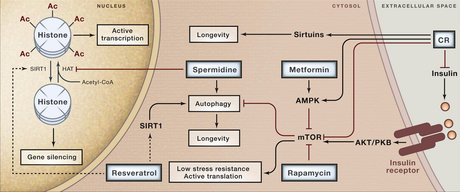de Cabo et al. have done a useful review of different approaches to delaying or reversing aging, and I pass on their abstract and two nice summary graphics.
The phenomenon of aging is an intrinsic feature of life. Accordingly, the possibility to manipulate it has fascinated humans likely since time immemorial. Recent evidence is shaping a picture where low caloric regimes and exercise may improve healthy senescence, and several pharmacological strategies have been suggested to counteract aging. Surprisingly, the most effective interventions proposed to date converge on only a few cellular processes, in particular nutrient signaling, mitochondrial efficiency, proteostasis, and autophagy. Here, we critically examine drugs and behaviors to which life- or healthspan-extending properties have been ascribed and discuss the underlying molecular mechanisms.

Figure 1.
-Health-Promoting Interventions against Age-Related Diseases
-Three distinct approaches are currently being tested as feasible strategies to counteract a series of disorders, whose risk of emergence is directly linked to increased age: (1) specific antiaging drugs, (2) fasting, which seems best associated to a beneficial diet that includes low protein consumption, and (3) periodic exercise. All of them have been shown to reduce the risk of age-related diseases in mammalian models, including neurodegeneration and cardiovascular disease, among others.

Figure 2.
-Molecular Targets for Caloric Restriction and Pharmacological Interventions against Premature Aging
-Caloric restriction promotes longevity through sirtuin activation as well as through inhibition of the insulin and TOR pathways, which both lead to stress resistance and autophagy activation. Resveratrol, rapamycin, and spermidine exert autophagy-dependent antiaging mechanisms that are exerted both at the cytosolic and nuclear levels. Whether resveratrol directly interacts with the sirtuin family member SIRT1 remains controversial. Metformin promotes AMPK activity and prevents oxidative damage. Ac, acetyl residue; HAT, histone acetyltransferase; AMPK, adenosine monophosphate-activated protein kinase; AKT/PKB, protein kinase B; CR, caloric restriction.

